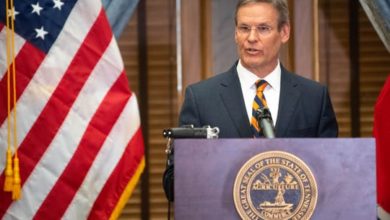Panama president appeals for “sincere” dialogue amid wave of protests

Panama City, Jul 14 (EFE).- Panamanian President Laurentino Cortizo appealed on Thursday for a dialogue that is “sincere and without a dual agenda,” urging that negotiations be launched to seek a solution to the wave of protests by unions and other groups striking to demand reductions in living costs and other measures.
“I have no doubt that with a sincere dialogue, without any dual agenda, we can continue moving forward, correcting what needs to be corrected,” said Cortizo in opening the dialogue, which is being mediated by Panamanian Archbishop Jose Domingo Ulloa but which has not been acknowledged by the protesting groups.
The head of state called for negotiations of “a respectful and humble nature that will allow free movement within the country,” emphasizing that protests are part of democracy, although he invited the demonstrators not to harm the rest of the public – “especially the most needy” – with their road blockades and other protest measures.
The president, who spoke before representatives of the business unions, members of the National Assembly and government ministers, complained that there are “infiltrated politicians” within the social movements and unions whose members are protesting.
These social movements who have taken to the streets “are OK,” but “they are being contaminated by politicians with bad intentions,” the Panamanian leader said, adding that he has “much information” supporting that claim.
During the establishment of the dialogue, a small group of demonstrators protested peacefully outside the site.
The People’s United Alliance for Life and the National Alliance for the Rights of the Organized People (Anadepo), which have been the main drivers of a teachers strike lasting more than a week as well as the broader protests, rejected attending the dialogue session inaugurated by the government on Thursday due to a lack of consensus prior to the meeting.
The United Alliance “is in agreement with negotiating with the government” but, to do so, “it’s necessary for the parties to be able to agree” in advance on matters such as “the mediator, the things the government must call for, the methodology, the issues to be discussed, the site, date and time,” said the general secretary of the Association of Teachers (Asoprof), Fernando Abrego.
The representatives of Anadepo, which has its headquarters in the interior province of Veraguas, refused to travel to the capital and also rejected the mediation of the Catholic Church, contending that this role is more properly accorded to the national Ombudsman’s Office.
The doors to dialogue “are open to all, without exclusion, the doors of the homeland will not be closed to anyone, they are open to all,” said Cortizo.
Late on Thursday afternoon, representatives of Anadepo and government technicians met in Veraguas in a session mediated by Eduardo Leblanc, the national Ombudsman.
“We cannot endanger or put at risk Panama’s democracy. Imperfect, it is. Profound changes must be made. Yes. But we must agree in order to move forward,” Leblanc said.
The protests were launched to demand reductions and freezes in the prices of fuel, food and medicines, a general pay hike and a bigger educational budget, but they have escalated to include repudiation of embezzlement of state resources and corruption, as can be read on the signs carried by demonstrators.
Hundreds of thousands of students have been unable to attend classes for more than a week and the blockades set up along the Inter-American Highway, which traverses the country and connects it with Central America, have resulted in shortages of certain food items in the capital and other urban centers, as well as a shortage of fuel in the interior.
Despite the fact that most of the demonstrations have transpired peacefully, there have been some isolated incidents that have resulted in police arresting more than a dozen people.
EFE adl/gf/enb/bp





